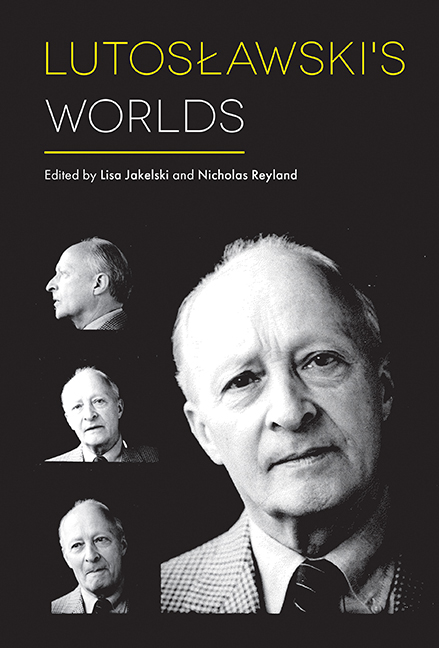Book contents
- Frontmatter
- Dedication
- Contents
- List of Figures
- List of Tables
- List of Music Examples
- List of Contributors
- Acknowledgements
- Introduction
- PART I mourning, modernism, and genius
- PART II other lutoslawskis
- PART III documents
- PART IV political engagement
- 11 Lutoslawski and Stalinism: Contextualizing Artistic and Political Choices around 1950
- 12 Lutoslawski's Political Refrains
- PART V legacies
- Bibliography
- Index
12 - Lutoslawski's Political Refrains
from PART IV - political engagement
Published online by Cambridge University Press: 14 June 2019
- Frontmatter
- Dedication
- Contents
- List of Figures
- List of Tables
- List of Music Examples
- List of Contributors
- Acknowledgements
- Introduction
- PART I mourning, modernism, and genius
- PART II other lutoslawskis
- PART III documents
- PART IV political engagement
- 11 Lutoslawski and Stalinism: Contextualizing Artistic and Political Choices around 1950
- 12 Lutoslawski's Political Refrains
- PART V legacies
- Bibliography
- Index
Summary
You haven't conducted in Poland for a long time. Is the only reason that your calendar is very full?
No.
– Witold Lutosławski in interview with Radio Free Europe, 15 December 1985
Witold Lutosławski enjoyed one of the most successful international careers of any performer or composer from Poland in the second half of the twentieth century. Over the course of the 1980s, this artistic reputation received concrete affirmation and financial reward in the form of the Ernst von Siemens Music Prize (1983), the inaugural Grawemeyer Prize (1984), the Queen Sofía Composition Prize (1985), and the Royal Philharmonic Society's Gold Medal (1986), to tally just a few of his decorations. Lutosławski, already in his early 70s, continued to be tremendously productive, completing the Third Symphony (1983), his three Chain compositions (1983, 1985, 1986), and the Piano Concerto (1988), all works that received bountiful public acclaim in Poland and abroad.
Saturated with such incontrovertible evidence of acknowledgement and opportunity, the composer's 1980s appear to have been unaffected by and even independent from the tumultuous politics of his homeland, where a brief window of freedom over 1980–81 paved the way for the declaration of martial law – the imposition of a stand-still on public life – in December 1981. This is the story Lutosławski would want us to believe. He claimed it as truth in conversation. He performed a detachment from the everyday with his reserved demeanor and elegance. He insisted upon his music's independence: he called the large-scale instrumental compositions of this period ‘pure’ and ‘absolute’ interchangeably, leaving extramusical associations up to listeners. He was famously ‘horrified’ by Rostropovich's interpretation of the Cello Concerto as a battle between the individual and a vicious Central Committee, preferring instead the abstract metaphor of conversation. The composer's discomfort with political interpretations of music making resounds in his fundamental reticence to speak loud or out. He also reiterated an explicit disinterest in and even rejection of music's cultural expediency. When music did work it was, for example, on or through the psyche, not on or with society.
This essay explores the ethos of Lutosławski's political refrains – both his resistance toward taking a stand and the strategy of repetition he employed when speaking about politics at all in the 1980s.
- Type
- Chapter
- Information
- Lutoslawski's Worlds , pp. 273 - 300Publisher: Boydell & BrewerPrint publication year: 2018



